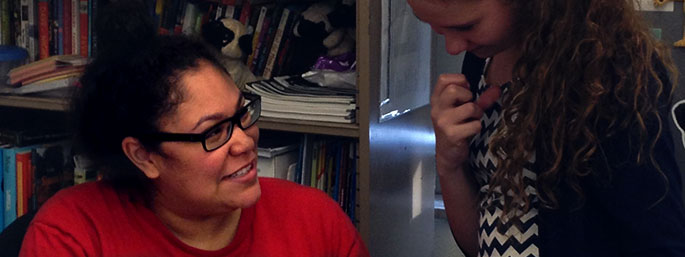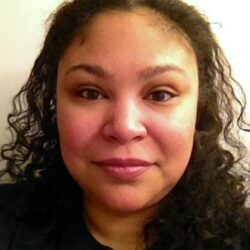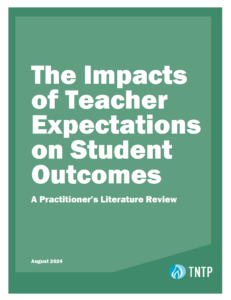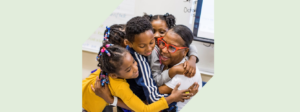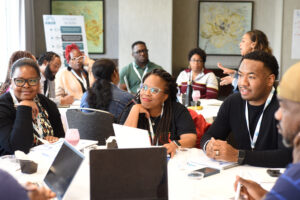At TNTP, we believe that a worthy teaching profession should be built around its most outstanding members. To find out what attracts and keeps exceptional teachers in the classroom, we surveyed 117 of the country’s most celebrated educators for our recent Perspectives of Irreplaceable Teachers project.
Today, we continue those efforts by turning over this space to Perspectives participant Tai Basurto, a National Board Certified teacher and recent Teach Plus Teaching Policy Fellow who teaches middle school reading at A.N. Pritzker School in Chicago Public Schools. In our Perspectives survey, teachers cited formal professional development as among the least helpful activities for improving the quality of their teaching. But, as Basurto describes below, not all PD is unhelpful, and teachers are hungry for the right kinds of development opportunities.
I was distributing copies of The Omnivore’s Dilemma by Michael Pollan recently when one of my seventh grade students asked, “Ms. Basurto, why is everything we read so heavy?”
It’s a reasonable observation. As a woman of color and a life-long Chicagoan, I try to present to my students a curriculum that is both academically rigorous and culturally relevant. I teach for a better, more tolerant world, and because I know my students are capable of wrestling with the “heavy,” I never hesitate to bring it into our classroom.
Teaching challenging content also keeps me engaged in the learning I require of my students. I come back each year (11 and counting) because teaching is a constant learning process. But I can’t teach this way without support, and neither can my colleagues across the country. As we make the transition to the Common Core, which asks more of teachers and students alike, it’s time for us to rethink how we approach professional development.
Like most teachers, I’ve sat through some bad PD. But I’ve also been supported by professional development organizations that have invested in me as a teacher and a learner. The PD that has changed my life as an educator has brought teachers together, to provide intensive, hands-on learning in collaborative environments—and these are the kinds of opportunities we need more of.
In contrast to the standard model of one-off professional development sessions, we need more ongoing workshops led by teachers who are experts in their fields and by coaches who know the local context. Time should be built into the school day for teachers to mentor and support one another and to engage in continuous collaboration. Teaching is too often done in isolation, but teachers cannot thrive alone. If we are to teach our students to be critical thinkers and productive humans, the work is far too difficult and too important for teachers to function as islands.
I’ve been lucky: I’ve had these sorts of chances. Through the Chicago Foundation for Education, I have participated in and coached several teacher-led study groups, in which we’ve studied strategies for vocabulary development and grammar instruction, created units, and examined student work. I like this kind of accountability—I am not doing my work in isolation when I am meeting regularly with colleagues to refine my practice. Likewise, after I participated in a week-long institute with Facing History and Ourselves, I was assigned a program associate who checks in regularly with me about how I am implementing Facing History in my classroom and what further supports I need.
In the summer of 2012, I participated in the Chicago Area Writing Project’s summer institute. Each morning for two weeks, we took off our teacher caps and assumed the role of active learners and students of writing. In the afternoons, we studied and discussed writing instruction. Throughout the following school year, that group of teachers met several times to reevaluate our work.
As a result, I learned to approach the teaching of writing in more creative, engaging ways, and to build time into the day for my students to write extensively on all the topics we’re discussing. They also engage in continuous revision, so they have a stronger understanding of how to improve their own writing based on feedback. Take my student Hope. She was a master at summarizing, but she struggled with generating original ideas. In the year after I participated in the writing instruction workshop, I introduced a new “writer’s notebook” activity into my classes. Hope’s writer’s notebook gave her the space and freedom to explore, experiment, make mistakes and revise thoughtfully. She produced powerful pieces that year in writing class, including letters to the CEO of Chicago Public Schools and the president of the Chicago Teacher’s Union about the importance of auxiliary teachers. She wrote a persuasive essay discouraging technology use before bed and a 10-chapter memoir mimicking the style of The House on Mango Street by Sandra Cisneros.
These experiences have encouraged me to continue to seek out PD, but I know that too many teachers haven’t had such strong opportunities. Perhaps with more professional development that challenges and connects teachers, we would have fewer novice teachers feeling overwhelmed and under-supported. The inspiration that teacher-led PD can offer has helped keep me on my toes for these 11 years. More opportunities like this could inspire more teachers to stick around for the long haul, invested in and prepared to meet the demands of our students—ready to engage with the heavy.
